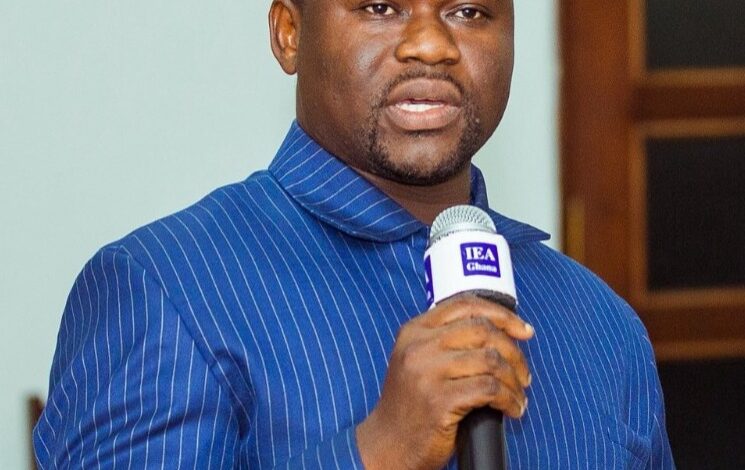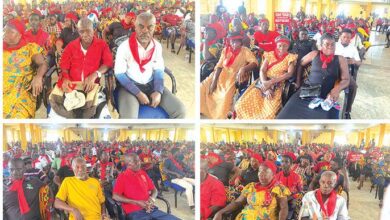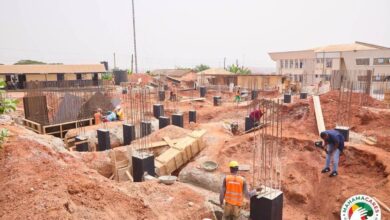Revocation of 278 Licenses: Mining Consultant Applauds Exercise But Warns Of Litigation

A mining engineer and consultant, Ing. Wisdom Gomashie, has cautioned the government over possible legal and political consequences following the revocation of 278 small-scale mining licences by the Minister of Lands and Natural Resources, Mr Emmanuel Armah-Kofi Buah.
The Minerals Commission, in a statement, announced that the affected licences were revoked for regulatory breaches and the expiration of operational permits after an audit ordered by the sector minister upon assumption of office.
While commending the minister for taking steps to sanitise the mining sector and curb illegal mining activities, Ing. Gomashie expressed concern over the process adopted, saying it could expose the state to litigation, if due process was not strictly followed.
“It is a good exercise marred by legal breaches and political undertones,” he stated.
According to him, the Minerals and Mining Regulations, particularly Regulation 251(3), require the Commission to issue a written notice and provide a 120-day grace period before any revocation of licence.
“My checks reveal that this was not done. Ghana is a country governed by the rule of law,” he added.
Ing. Gomashie further raised concerns about fairness and equity in the enforcement of mining regulations, noting that foreign-owned firms were often given time to rectify breaches, while local small-scale operators were abruptly shut down.
“We cannot apply the same law differently and expect the small-scale sector to formalise overnight,” he observed.
He urged the Ministry and the Minerals Commission to ensure transparency, fairness and adherence to due process to avoid potential litigation and social unrest within mining communities.
Below Is Published, Full Statement:
REVOCATION OF 278 SMALL-SCALE MINING LICENSES: A GOOD EXERCISE MARRED BY LEGAL BREACHES & POLITICAL UNDERTONES
Yesterday, Thursday, October 23, 2025, the Minerals Commission issued a statement indicating that 278 small-scale mining licenses have been revoked/terminated by the Minister of Lands & Natural Resources, Hon. Emmanuel Armah-Kofi Buah.
This comes on the back of audit activities initiated by the Minister responsible for Mines from the beginning of the year. The grounds for the revocations and terminations were based on regulatory breaches and expiration of licenses.
In a July 21, 2025 report, the Minister indicated that 962 out of 1,278 were found with multiple irregularities. Subsequently, he indicated 55 had already been revoked, leaving 902 and today, 278 have been revoked.
My Comments
- I first of all commend the Minister of Lands and Natural Resources, Hon. Emmanuel Armah Kofi Buah for this effort, as done by previous administrations as well. The last of such was the Tutu-Agyare-led Minerals Concession Audit Committee commissioned on October 27, 2021 empaneled by Hon. Samuel A. Jinapor Hon. George Mireku Duker. The recommendations of that committee fed into steps to overhaul the Mining Policies and Act in 2023.
- It must clearly be indicated that any small-scale mining license which is in the system now was either renewed or granted by the last NPP administration, since the last time an NDC government was in office was in 2016, and with a small-scale mining license tenor of 5 years, would expire in 2021, ceteris paribus. This technical is backed by the recent government’s claim of no issuing any of such when they assumed office.
- What this means is that if 2,000+ licenses are attached to the previous administration, then it means over 85% of licenses granted or renewed by the NPP have passed the NDC’s integrity test of compliance as per this directive.
- Going through the list of 278 licenses revoked and undertaking some background checks coupled with my experience, some were granted just in December 2024, and some prior to the handing over on January 7, 2025, and have not undertaken any work on the ground. I want to reiterate that, a license granted after a certain December 7 is not enough grounds to revoke or terminate same, in line with Regulations 211 and/or 251 of the Minerals & Mining (Licensing) Regulations, 2012, L.I. 2176. Any such revocation will lead to numerous legal suits and possible judgment debt on government. A dangerous precedence.
- Subject to (4), the time a Minister signs a license, when it is registered at the Ministry’s Registry and when it reaches the Minerals Commission for final registration into the cadastral system may vary and since mostly, dates by the Ministry’s registry is proxied as the starting date of the said license, for example, a Minister can sign a document on January 6 but registry dispatches it on January 8, the date of registry does not invalidate the Executive power of the Minister. The Honorable Minister should be aware of this and not create any dangerous precedence.
- In line with Regulation 251(3), subject to Regulation 251(2), which takes inspiration from Regulations 168–170 of the Minerals & Mining (Licensing) Regulations, 2012, L.I. 2176, the Minerals Commission is to, before the termination of a small-scale mining license, give written notice to the holder of the license stating the breach(es) which form the grounds for termination, and the holder must be given up to 120 days to remedy as set out in form 87 of the first schedule. My checks reveal that this was not done. Ghana is a country of rule of law.
- It is instructive to indicate that, the expiration of small-scale mining license is not in itself a ground of revocation if the holder have in line with regulation 252(1) subject to regulation 104(1) of L.I. 2176 puts in an application for renewal not later than 90 days before the expiration of the existing license. How many of the 278 licenses have expired, did they re-apply within the 90-day notice? If they did, why no grant? If they did’nt can this catalogue indicate which is which?
- Regulation 252(2) stipulates that, “On expiration of the term of a small-scale mining license, the Minerals Commission shall give notice to the holder as set out in Form 90 of the First Schedule. My checks indicates that, this is not yet done.
- In reference to point 6 above, In the year 2025, the Minerals Commission is yet to make any recommendation to the Minister for a grant of license, the Minister responsible for Mines and the President of the Republic have proclaimed that, they haven’t issue or renew any small-scale mining license, so why should some license holders suffer an institutional pause?
- Small-scale mining in Ghana is the country’s backbone of gold trade since the MNCs are foreign-owned, and we cannot seem to be applying the same law differently on these scales of mining and expect the small-scale mining sector to get formalized overnight.
- In recent precedents, companies such as Future Global Resources and Heath Goldfields—all of the Bogoso Prestea Mines—were given written notices of their breaches and 120 days’ remedy period to rectify same.
- In line with Sections 21 and 22 of the Minerals and Mining (Health, Safety and Technical) Regulations, 2012, L.I. 2182, Mining Inspectors issue improvement and prohibitory notices respectively to mining operations (large and small scale) whose part or whole operations, or even working environments or acts, pose danger to humans, the environment, or breach provisions of the Act and regulations to rectify and sometimes accompanied by fines. Why don’t we apply this same rule to small-scale mining companies often, instead of waking up one day just to say, “close down,” and expect formalization to happen overnight?
Conclusion and Recommendations
While it is a good administrative step taken by the Honorable Minister of Lands & Natural Resources and the Minerals Commission, it should be noted that, such audit exercises are to help sanitize the mineral cadastral system and must be done in strict conformance to Law, Procedures and Equity. Decisions of revocations tainted with political connotations and biases will rather worsen illegal mining.
I do hereby recommend that,
- The Minister and the Minerals Commission must review the list again to make sure due procedure and the basis of the law are abided by in arriving at any revocation of any of such licenses. Certainly, those who fail the test must stand to be revoked. The list here should be disaggregated and put under various headings of breaches. Ghanaians deserve to know the grounds of such terminations case by case which will even be a good material to guide prospective miners. Resource Governance cannot thrive in secrecy.
- Ghana has only one mining code for all scales of production mining and must apply same on all scales. Small-scale mining companies must be served with notices when they breach, given a period to rectify, and on failure, we as a country have all justification to revoke same if they fail as the laws stipulates.
- The Minister should not set any precedent which may affect certain mining operations in the future regarding the revocation of some licenses just because they were granted after elections, it doesn’t hold water.
- The Minister of Lands and Natural Resources should kindly make sure that, after ensuring a license is validly revoked/terminated the re-award of same should not be political or a subject of institutional personal re-allocation. At best, existing holders should be given the opportunity to re-apply to avoid conflicts in those mining communities. Further, in line with section 89 of Act 703 and Regulation 253(1) of L. I. 2176, such areas shoud be designated for small-scale and community/cooperative mining operations under RComsdep Ghana that may be struggling to get earmarked areas for alternative livelihood projects.
- The Minerals Commission should not be used as a vehicle by politicians to target miners who may not be aligned to a certain party. It is dangerous and will only worsen the illegal mining situation.
- The Minerals Commission must not always wait for ministerial committees before they execute their duties of recommending revocations to the Minister, just as they recommend same for grant. The absence of recommending revocation of small-scale mining licenses to the Minister may mean unsatisfactory inspections of mining operations, which may or may not be the case.
- In line with (6) above, the Minister and the Commission should ensure that, all District Officers and Offices of the Minerals Commission reports directly to the respective Regional Offices in line of discharging their duties;
- District Officers should necessarily be qualified or certified inspectors and at best, the Commission should establish small-scale units at all regional offices. The situation where district officers reports directly to Accra and we expect Regional Inspectorates Offices to be in charge of compliance cannot work in the current setup.
- Failure for the Minister to adhere to procedure in any of such revocations will lead to unrest in the affected areas, and in most cases, illegal mining will become rife since there will be a breakdown of law and order.
Let’s work together to make Ghana’s Mining Industry a great one.
Thank you.



